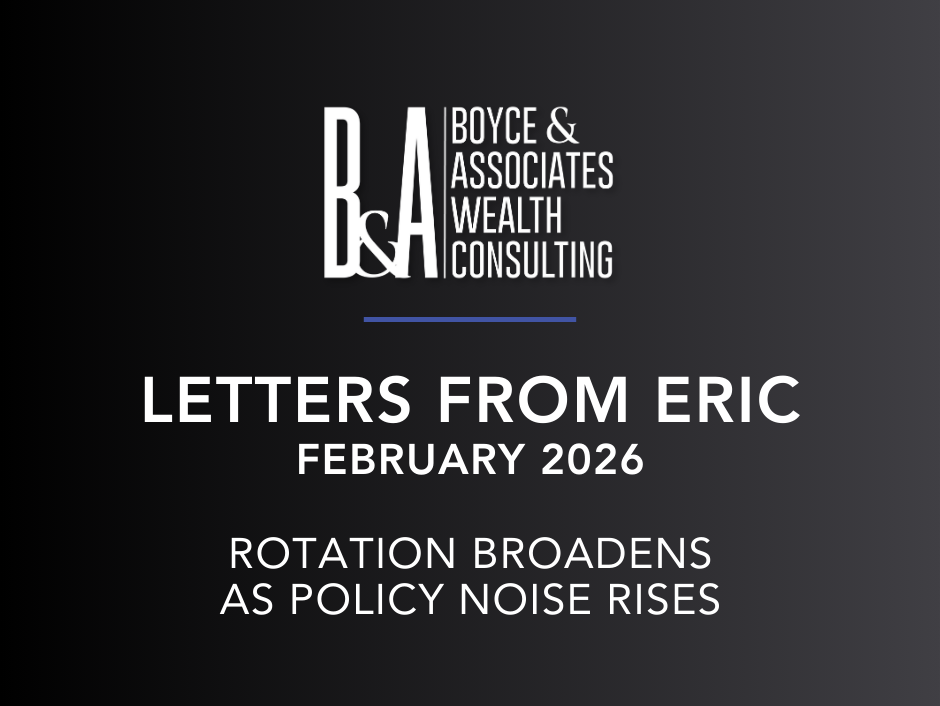Mid-Year Crosscurrents: Policy, Earnings, and Rates
Newsletter — May 2025
Dear Clients and Friends,
The last month has witnessed a virtual sea of change. Starting with the announced tariffs as part of the “Liberation Day” initiative on April 2nd, and including other impromptu and unexpected policy moves, we have observed in short order the sort of volatility and variable changes in expectations which haven’t been seen in quite a while.
What We are Watching For:
- Economic Data Releases: Keep an eye on upcoming or recently released economic data (e.g., inflation figures, employment reports, GDP growth). Surprises or deviations from expectations can fuel volatility.
- Federal Reserve Policy: Any hints or announcements regarding the Federal Reserve's monetary policy, particularly interest rate decisions and forward guidance, are likely to impact market volatility. Markets are likely going to be quite sensitive to any signals about future rate adjustments.
- Geopolitical Events: Global events, especially those with economic or political ramifications (e.g., ongoing conflicts, trade tensions, political instability in key regions), can introduce significant volatility.
- Corporate Earnings Season: As we are in the middle of earnings season for the first quarter of 2025, corporate earnings reports and future outlook statements will be closely watched and can lead to stock-specific and broader market volatility.
To address the many questions investors have about volatility, I recently published a Charts of the Week which provides some meaningful long term historical perspective on the notion of “volatility”.
Some General Observations:
- Normal Market Behavior: Market volatility is an inherent characteristic of financial markets. It reflects the dynamic interplay of investor sentiment, economic data, and global events. Periods of both high and low volatility are to be expected over the long term.
- Not Necessarily Negative: While sharp drops can be unsettling, volatility also presents potential opportunities for investors. Price swings can create chances to buy assets at lower prices or to rebalance portfolios strategically.
- Investor Sentiment Indicator: Increased volatility often signals uncertainty or heightened emotions among investors, sometimes referred to as a "fear index" (like the VIX).
Key Specific Takeaways:
- Equity markets were almost always higher 1 year later following the worst single-day percentage declines in history, and markets generally exhibited very respectable annualized performance over the subsequent 3 and 5 years. .
- A drop of 5% in the S&P 500 generally happens three times a year; a 10% drop happens roughly every 16 months (*), and 20% drops every 5.5 years.
- Over the last 99 years, the S&P 500 has witnessed a positive return 73 times for an average annual return of 21.5%, and a negative return 26 times with an average decline of 13.4%.
- Bull markets are MUCH more prevalent than bear markets, and generally last much, much longer.
- Stocks often witness meaningful intra-year declines yet end the year with a resoundingly positive return.
What is the Impact on Investors:
- Anxiety and Emotional Decisions: High volatility can trigger anxiety and lead to impulsive investment decisions, such as selling low during a downturn. It's crucial to stick to a long-term plan and avoid emotional reactions. Since the end of 1979, if you had missed just the 5 best days in the S&P 500, you would have experienced a 38% drop in total return. If you missed the best 30 days, you would have missed out on almost 84%!
- Short-Term vs. Long-Term: Investors with shorter time horizons might be more sensitive to volatility, while long-term investors may view it as an opportunity. Consider your individual financial goals and time horizon. The probability of a single-day positive return in the S&P 500 is about 53%; over 1 year that is over 77%, which goes up considerably over time. Over 10 years, the probability of positive annualized returns is over 97%. Therefore, time is a wonderful diversification tool.
Managing Volatility:
- Diversification: A well-diversified portfolio across different asset classes (stocks, bonds, real estate, etc.) can help mitigate the impact of volatility in any single area.
- Long-Term Perspective: Focusing on your long-term investment goals rather than short-term market swings is crucial.
- Regular Rebalancing: Periodically rebalancing your portfolio can help maintain your desired asset allocation and manage risk during volatile periods.
- Dollar-Cost Averaging: If you are regularly investing, dollar-cost averaging (investing a fixed amount at regular intervals) can help reduce the risk of buying high during volatile periods.
- Staying Informed (but not overreacting): Keep abreast of market news and economic developments, but avoid excessive focus on short-term noise that can lead to emotional decisions.
We are here to help you understand your risk tolerance, develop a suitable investment strategy, and provide guidance during these volatile times.
In conclusion, market volatility is a normal part of investing. Understanding its potential causes and impacts, and having a well-thought-out investment strategy, are key to navigating these periods successfully. Remember to stay informed, remain disciplined, and focus on your long-term financial goals.
Sincerely,
Eric Boyce, CFA
President & CEO
(*) Data sourced from First Trust Portfolios
Forward-looking statements, estimates, and certain information contained herein are based upon proprietary and non-proprietary research and other sources. Information contained herein has been obtained from sources believed to be reliable but are not assured as to accuracy. Past performance is not indicative of future results. There is neither representation nor warranty as to the current accuracy of, nor liability for, decisions based on such information.
Risks: All investments, including stocks, bonds, commodities, alternative investments and real assets, should be considered speculative in nature and could involve risk of loss. All investors are advised to fully understand all risks associated with any kind of investment they choose to make. Hypothetical or simulated performance is not indicative of future results.
Investment advisory services offered through Boyce & Associates Wealth Consulting, Inc., a registered investment adviser. Boyce & Associates Wealth Consulting, Inc. has Representatives Licensed to sell Life Insurance in TX and other states.










